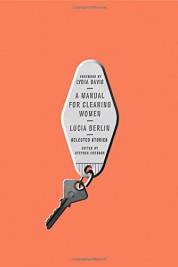
A Manual For Cleaning Women
Pages: 432
Edition: Hardcover
List Price: $26
Publisher: Farrar, Straus & Giroux
ISBN: 9780374202392
First entered: 22
Number of weeks: 2
Book Summary
One of The New York Times Book Review's Ten Best Books of 2015"I have always had faith that the best writers will rise to the top, like cream, sooner or later, and will become exactly as well-known as they should be-their work talked about, quoted, taught, performed, filmed, set to music, anthologized. Perhaps, with the present collection, Lucia Berlin will begin to gain the attention she deserves." -Lydia DavisA MANUAL FOR CLEANING WOMEN compiles the best work of the legendary short-story writer Lucia Berlin. With the grit of Raymond Carver, the humor of Grace Paley, and a blend of wit and melancholy all her own, Berlin crafts miracles from the everyday, uncovering moments of grace in the Laundromats and halfway houses of the American Southwest, in the homes of the Bay Area upper class, among switchboard operators and struggling mothers, hitchhikers and bad Christians. Readers will revel in this remarkable collection from a master of the form and wonder how they'd ever overlooked her in the first place.
Authors

Name: Lucia Berlin
Born: Nov, 1936
Died: Nov, 2004
About the author:
Berlin began publishing relatively late in life, under the encouragement and sometimes tutelage of poet Ed Dorn. Her first small collection, Angels Laundromat was published in 1981, but her published stories were written as early as 1960. Several of her stories appeared in magazines such as The Atlantic and Saul Bellow’s little magazine The Noble Savage.
Berlin published six collections of short stories, but most of her work can be found in three later volumes from Black Sparrow Books: Homesick: New and Selected Stories, So Long: Stories 1987-92 and Where I Live Now: Stories 1993-98.
Berlin was never a bestseller, but was widely influential within the literary community. She aspired to Chekhov's objectivity and refusal to judge. She has also been widely compared to Raymond Carver and Richard Yates. One of her most memorable achievements was the stunning one-page story "My Jockey," which captured a world, a moment and a panoramic movement in five quick paragraphs. It won the Jack London Short Prize for 1985. Berlin also won an American Book Award in 1991 for Homesick, and was awarded a fellowship from the National Endowment for the Arts.

Name: Stephen Emerson

Name: Lydia Davis
Hometown: Northampton (Massachusetts)
Born: Jul, 1947
About the author:
Lydia Davis, acclaimed fiction writer and translator, is famous in literary circles for her extremely brief and brilliantly inventive short stories. In fall 2003 she received one of 25 MacArthur Foundation “Genius” awards. In granting the award the MacArthur Foundation praised Davis’s work for showing “how language itself can entertain, how all that what one word says, and leaves unsaid, can hold a reader’s interest. . . . Davis grants readers a glimpse of life’s previously invisible details, revealing new sources of philosophical insights and beauty.” In 2013 She was the winner of the Man Booker International prize.
Davis’s recent collection, “Varieties of Disturbance” (May 2007), was featured on the front cover of the “Los Angeles Times Book Review” and garnered a starred review from “Publishers Weekly.” Her “Samuel Johnson Is Indignant” (2001) was praised by “Elle” magazine for its “Highly intelligent, wildly entertaining stories, bound by visionary, philosophical, comic prose—part Gertrude Stein, part Simone Weil, and pure Lydia Davis.”
Davis is also a celebrated translator of French literature into English. The French government named her a Chevalier of the Order of Arts and Letters for her fiction and her distinguished translations of works by Maurice Blanchot, Pierre Jean Jouve, Michel Butor and others.
Davis recently published a new translation (the first in more than 80 years) of Marcel Proust’s masterpiece, “Swann’s Way” (2003), the first volume of Proust’s “In Search of Lost Time.” A story of childhood and sexual jealousy set in fin de siecle France, “Swann’s Way” is widely regarded as one of the most important literary works of the 20th century.
The “Sunday Telegraph” (London) called the new translation “A triumph [that] will bring this inexhaustible artwork to new audiences throughout the English-speaking world.” Writing for the “Irish Times,” Frank Wynne said, “What soars in this new version is the simplicity of language and fidelity to the cambers of Proust’s prose… Davis’ translation is magnificent, precise.”
Davis’s previous works include “Almost No Memory” (stories, 1997), “The End of the Story” (novel, 1995), “Break It Down” (stories, 1986), “Story and Other Stories” (1983), and “The Thirteenth Woman” (stories, 1976).
Grace Paley wrote of “Almost No Memory” that Lydia Davis is the kind of writer who “makes you say, ‘Oh, at last!’—brains, language, energy, a playfulness with form, and what appears to be a generous nature.” The collection was chosen as one of the “25 Favorite Books of 1997” by the “Voice Literary Supplement” and one of the “100 Best Books of 1997” by the “Los Angeles Times.”
Davis first received serious critical attention for her collection of stories, “Break It Down,” which was selected as a finalist for the PEN/Hemingway Award. The book’s positive critical reception helped Davis win a prestigious Whiting Writer’s Award in 1988.
She is the daughter of Robert Gorham Davis and Hope Hale Davis. From 1974 to 1978 Davis was married to Paul Auster, with whom she has a son, Daniel Auster. Davis is currently married to painter Alan Cote, with whom she has a son, Theo Cote. She is a professor of creative writing at University at Albany, SUNY.
Davis is considered hugely influential by a generation of writers including Jonathan Franzen, David Foster Wallace and Dave Eggers, who once wrote that she "blows the roof off of so many of our assumptions about what constitutes short fiction."